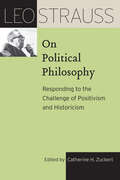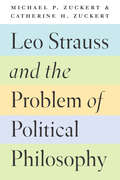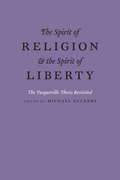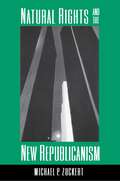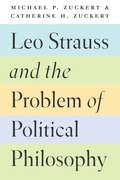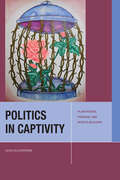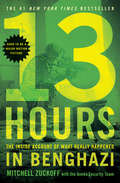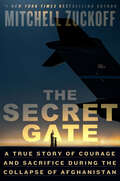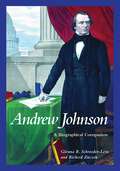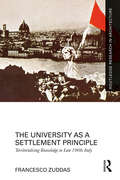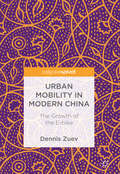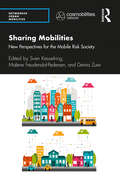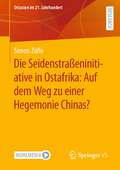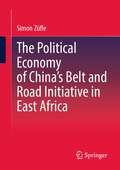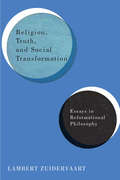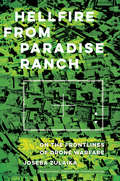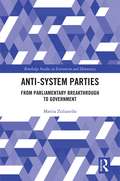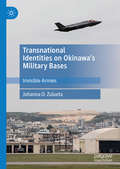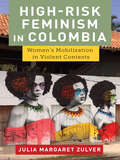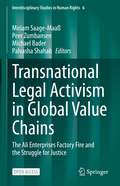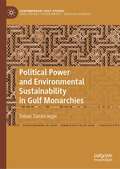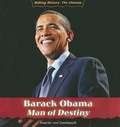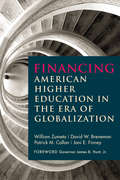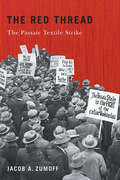- Table View
- List View
Leo Strauss on Political Philosophy: Responding to the Challenge of Positivism and Historicism (The Leo Strauss Transcript Series)
by Catherine H. Zuckert Leo StraussLeo Strauss is known primarily for reviving classical political philosophy through careful analyses of works by ancient thinkers. As with his published writings, Strauss’s seminars devoted to specific philosophers were notoriously dense, accessible only to graduate students and scholars with a good command of the subject. In 1965, however, Strauss offered an introductory course on political philosophy at the University of Chicago. Using a conversational style, he sought to make political philosophy, as well as his own ideas and methods, understandable to those with little background on the subject. Leo Strauss on Political Philosophy brings together the lectures that comprise Strauss’s “Introduction to Political Philosophy.” Strauss begins by emphasizing the importance of political philosophy in determining the common good of society and critically examining the two most powerful contemporary challenges to the possibility of using political theory to learn about and develop the best political order: positivism and historicism. In seeking the common good, classical political philosophers like Plato and Aristotle did not distinguish between political philosophy and political science. Today, however, political philosophy must contend with the contemporary belief that it is impossible to know what the good society really is. Strauss emphasizes the need to study the history of political philosophy to see whether the changes in the understanding of nature and conceptions of justice that gradually led people to believe that it is not possible to determine what the best political society is are either necessary or valid. In doing so, he ranges across the entire history of political philosophy, providing a valuable, thematically coherent foundation, including explications of many canonical thinkers, such as Auguste Comte and Immanuel Kant, about whom Strauss did not write extensively in his published writings.
Leo Strauss and the Problem of Political Philosophy
by Catherine H. Zuckert Michael P. ZuckertLeo Strauss and his alleged political influence regarding the Iraq War have in recent years been the subject of significant media attention, including stories in the Wall Street Journal and New York Times.Time magazine even called him “one of the most influential men in American politics.” With The Truth about Leo Strauss, Michael and Catherine Zuckert challenged the many claims and speculations about this notoriously complex thinker. Now, with Leo Strauss and the Problem of Political Philosophy, they turn their attention to a searching and more comprehensive interpretation of Strauss’s thought as a whole, using the many manifestations of the “problem of political philosophy” as their touchstone. For Strauss, political philosophy presented a “problem” to which there have been a variety of solutions proposed over the course of Western history. Strauss’s work, they show, revolved around recovering—and restoring—political philosophy to its original Socratic form. Since positivism and historicism represented two intellectual currents that undermined the possibility of a Socratic political philosophy, the first part of the book is devoted to Strauss’s critique of these two positions. Then, the authors explore Strauss’s interpretation of the history of philosophy and both ancient and modern canonical political philosophers, including Plato, Aristotle, Machiavelli, and Locke. Strauss’s often-unconventional readings of these philosophers, they argue, pointed to solutions to the problem of political philosophy. Finally, the authors examine Strauss’s thought in the context of the twentieth century, when his chief interlocutors were Schmitt, Husserl, Heidegger, and Nietzsche. The most penetrating and capacious treatment of the political philosophy of this complex and often misunderstood thinker, from his early years to his last works, Leo Strauss and the Problem of Political Philosophy reveals Strauss’s writings as an attempt to show that the distinctive characteristics of ancient and modern thought derive from different modes of solving the problem of political philosophy and reveal why he considered the ancient solution both philosophically and politically superior.
The Spirit of Religion and the Spirit of Liberty: The Tocqueville Thesis Revisited
by Michael ZuckertTocqueville’s thesis on the relation between religion and liberty could hardly be timelier. From events in the Middle East and the spread of Islamist violence in the name of religion to the mandated coverage under the Affordable Care Act, the interaction between religion and politics has once again become central to political life. Tocqueville, facing the coming of a new social and political order within the traditional society that was France, faced this relation between politics and religion with freshness and relevance. He was particularly interested in reporting to his French compatriots on how the Americans had successfully resolved what, to many Frenchmen, looked to be an insuperable conflict. His surprising thesis was that the right kind of arrangement—a certain kind of separation of church and state that was not also a complete separation of religion and politics—could be seen in nineteenth century America to be beneficial to both liberty and religion. This volume investigates whether Tocqueville’s depiction was valid for the America he investigated in the 1830s and whether it remains valid today.
Natural Rights and the New Republicanism
by Michael P. ZuckertIn Natural Rights and the New Republicanism, Michael Zuckert proposes a new view of the political philosophy that lay behind the founding of the United States. In a book that will interest political scientists, historians, and philosophers, Zuckert looks at the Whig or opposition tradition as it developed in England. He argues that there were, in fact, three opposition traditions: Protestant, Grotian, and Lockean. Before the English Civil War the opposition was inspired by the effort to find the "one true Protestant politics--an effort that was seen to be a failure by the end of the Interregnum period. The Restoration saw the emergence of the Whigs, who sought a way to ground politics free from the sectarian theological-scriptural conflicts of the previous period. The Whigs were particularly influenced by the Dutch natural law philosopher Hugo Grotius. However, as Zuckert shows, by the mid-eighteenth century John Locke had replaced Grotius as the philosopher of the Whigs. Zuckert's analysis concludes with a penetrating examination of John Trenchard and Thomas Gordon, the English "Cato," who, he argues, brought together Lockean political philosophy and pre-existing Whig political science into a new and powerful synthesis. Although it has been misleadingly presented as a separate "classical republican" tradition in recent scholarly discussions, it is this "new republicanism" that served as the philosophical point of departure for the founders of the American republic.
Leo Strauss and the Problem of Political Philosophy
by Michael P. Zuckert Catherine H. ZuckertLeo Strauss and his alleged political influence regarding the Iraq War have in recent years been the subject of significant media attention, including stories in the Wall Street Journal and New York Times. Time magazine even called him "one of the most influential men in American politics. ” With The Truth about Leo Strauss, Michael and Catherine Zuckert challenged the many claims and speculations about this notoriously complex thinker. Now, with Leo Strauss and the Problem of Political Philosophy, they turn their attention to a searching and more comprehensive interpretation of Strauss’s thought as a whole, using the many manifestations of the "problem of political philosophy” as their touchstone. For Strauss, political philosophy presented a "problem” to which there have been a variety of solutions proposed over the course of Western history. Strauss’s work, they show, revolved around recovering--and restoring--political philosophy to its original Socratic form. Since positivism and historicism represented two intellectual currents that undermined the possibility of a Socratic political philosophy, the first part of the book is devoted to Strauss’s critique of these two positions. Then, the authors explore Strauss’s interpretation of the history of philosophy and both ancient and modern canonical political philosophers, including Plato, Aristotle, Machiavelli, and Locke. Strauss’s often-unconventional readings of these philosophers, they argue, pointed to solutions to the problem of political philosophy. Finally, the authors examine Strauss’s thought in the context of the twentieth century, when his chief interlocutors were Schmitt, Husserl, Heidegger, and Nietzsche. The most penetrating and capacious treatment of the political philosophy of this complex and often misunderstood thinker, from his early years to his last works, Leo Strauss and the Problem of Political Philosophy reveals Strauss’s writings as an attempt to show that the distinctive characteristics of ancient and modern thought derive from different modes of solving the problem of political philosophy and reveal why he considered the ancient solution both philosophically and politically superior.
Politics in Captivity: Plantations, Prisons, and World-Building (Just Ideas)
by Lena ZuckerwiseFrom the 1811 German Coast Slave Rebellion to the 1971 Attica Prison Uprising, from the truancy of enslaved women to the extreme self-discipline exercised by prisoners in solitary confinement, Black Americans have, through time, resisted racial regimes in extraordinary and everyday ways. Though these acts of large and small-scale resistance to slavery and incarceration are radical and transformative, they have often gone unnoticed. This book is about Black rebellion in captivity and the ways that many of the conventional well-worn constructs of academic political theory render its political dimensions obscure and indiscernible. While Hannah Arendt is an unlikely theorist to figure prominently in any discussion of Black politics, her concepts of world and worldlessness offer an indispensable framework for articulating a theory of resistance to chattel and carceral captivity. Politics in Captivity begins by taking seriously the ways in which slavery and incarceration share important commonalities, including historical continuity. In Zuckerwise’s account of this commonality, the point of connection between enslaved and incarcerated people is not exploited labor, but rather resistance. The relations between the rebellions of both groups appear in the writings of Muhammed Ahmad, Angela Davis, George Jackson, Ruchell Magee, and Assata Shakur, a genre Zuckerwise calls Black carceral political thought. The insights of these thinkers and activists figure into Zuckerwise’s analyses of largescale uprisings and quotidian practices of resistance, which she conceives as acts of world-building, against conditions of forced worldlessness. In a moment when a collective racial reckoning is underway; when Critical Race Theory is a target of the Right; when prison abolition has become more prominent in mainstream political discourse, it is now more important than ever to look to historical and contemporary practices of resistance to white domination.
13 Hours: The Inside Account of What Really Happened In Benghazi
by Mitchell ZuckoffThe harrowing, true account from the brave men on the ground who fought back during the Battle of Benghazi.13 Hours presents, for the first time ever, the true account of the events of September 11, 2012, when terrorists attacked the US State Department Special Mission Compound and a nearby CIA station called the Annex in Benghazi, Libya. A team of six American security operators fought to repel the attackers and protect the Americans stationed there. Those men went beyond the call of duty, performing extraordinary acts of courage and heroism, to avert tragedy on a much larger scale. This is their personal account, never before told, of what happened during the thirteen hours of that now-infamous attack.13 Hours sets the record straight on what happened during a night that has been shrouded in mystery and controversy. Written by New York Times bestselling author Mitchell Zuckoff, this riveting book takes readers into the action-packed story of heroes who laid their lives on the line for one another, for their countrymen, and for their country.13 Hours is a stunning, eye-opening, and intense book--but most importantly, it is the truth. The story of what happened to these men--and what they accomplished--is unforgettable.
The Secret Gate: A True Story of Courage and Sacrifice During the Collapse of Afghanistan
by Mitchell ZuckoffThe incredible true story of a breathtaking rescue in the frenzied final hours of the U.S. evacuation of Afghanistan—and how a brave Afghan mother and a compassionate American officer engineered a daring escape—from the #1 New York Times bestselling author of 13 HoursWhen the U.S. began its withdrawal from Afghanistan and the Afghan Army instantly collapsed, Homeira Qaderi was marked for death at the hands of the Taliban. A celebrated author, academic, and champion for women's liberation, Homeira had achieved celebrity in her home country by winning custody of her son in a contentious divorce, a rarity in Afghanistan's patriarchal society. As evacuation planes departed above, Homeira was caught in the turmoil at the Kabul Airport, trying and failing to secure escape for her and her eight-year-old son, Siawash, along with her parents and the rest of their family. Meanwhile, a young American diplomat named Sam Aronson was enjoying a brief vacation between assignments when chaos descended upon Afghanistan. Sam immediately volunteered to join the skeleton team of remaining officials at Kabul Airport, frantically racing to help rescue the more than 100,000 stranded Americans and their Afghan helpers. When Sam learned that the CIA had established a secret entrance into the airport two miles away from the desperate crowds crushing toward the gates, he started bringing families directly through, personally rescuing as many as fifty-two people in a single day. On the last day of the evacuation, Sam was contacted by Homeira's literary agent, who persuaded him to help her escape. He needed to risk his life to get them through the gate in the final hours before it closed forever. He borrowed night-vision goggles and enlisted a Dari-speaking colleague and two heavily armed security contract &“shooters.&” He contacted Homeira with a burner phone, and they used a flashlight code signal borrowed from boyhood summer camp. For her part, Homeira broke Sam&’s rules and withstood his profanities. Together they braved gunfire by Afghan Army soldiers anxious about the restive crowds outside the airport. Ultimately, to enter the airport, Homeira and Siawash would have to leave behind their family and everything they had ever known. The Secret Gate tells the thrilling, emotional tale of a young man's courage and a mother and son&’s skin-of-the-teeth escape from a homeland that is no longer their own.
Andrew Johnson: A Biographical Companion
by Richard Zuczek Glenna R. Schroeder-LeinThis A-Z encyclopedia provides carefully selected entries covering the people, events, and concepts relevant to Andrew Johnson's life.
The University as a Settlement Principle: Territorialising Knowledge in Late 1960s Italy (Routledge Research in Architecture)
by Francesco ZuddasThe 1960s and the 1970s marked a generational shift in architectural discourse at a time when the revolts inside universities condemned the academic institution as a major force behind the perpetuation of a controlling society. Focusing on the crisis and reform of higher education in Italy, The University as a Settlement Principle investigates how university design became a lens for architects to interpret a complex historical moment that was marked by the construction of an unprecedented number of new campuses worldwide. Implicitly drawing parallels with the contemporary condition of the university under a regime of knowledge commodification, it reviews the vision proposed by architects such as Vittorio Gregotti, Giuseppe Samonà, Archizoom, Giancarlo De Carlo, and Guido Canella, among others, to challenge the university as a bureaucratic and self-contained entity, and defend, instead, the role of higher education as an agent for restructuring vast territories. Through their projects, the book discusses a most fertile and heroic moment of Italian architectural discourse and argues for a reconsideration of architecture’s obligation to question the status quo. This work will be of interest to postgraduate researchers and academics in architectural theory and history, campus design, planning theory, and history.
Urban Mobility in Modern China: The Growth Of The E-bike
by Dennis ZuevThis book is an empirically rich case-study of what is currently the most popular alternative-fuel vehicle in the history of motorization – the electric two-wheeler (e-bike). The book provides sociological insights into e-bike mobility in China and discusses politics, social practices and larger issues of mobility transition in urban China. Taking an accessible approach to the subject, the book identifies the main sociospatial conflicts regarding the use of e-bikes and discusses why electric two-wheeler mobility is important for the future of urban China and urban transportation globally. This book will be an invaluable read for urban geographers and transportation researchers, but also for academics and general readers interested in Chinese Studies, specifically in the area of urban mobility in China.
Sharing Mobilities: New Perspectives for the Mobile Risk Society (Networked Urban Mobilities Series)
by Dennis Zuev Sven Kesselring Malene Freudendal-PedersenSharing Mobilities focuses on the emergence of future sustainable and collaborative mobility cultures. At the intersection of physical and virtual capacity and access to people, goods, ideas, and services, this book poses fundamental challenges and opportunities for governance, economy, planning, and identity. The future of new collaborative forms of consumption and sharing would play a key role in the organization of everyday life and business. Sharing mobilities is more than simply sharing transport, and its diverse impacts on society and the environment demand thorough theory-led sociological research. With an extensive global range, the contributors present radical manifestations of sharing capacities throughout diverse countries, including Germany, Denmark, Japan, and Vietnam. The phenomenon of mobility is highly actual and social as well as politically relevant and urging. This collection focuses on open questions from the perspective of the mobilities turn while presenting state-of-the-art theory-based articles with applied perspectives. An ideal read for scholars based in social science and the interdisciplinary research on mobility, transports, and sharing economy. Sociologists, geographers, economists, urban governance researchers, and research students would also find this book of interest.
Die Seidenstraßeninitiative in Ostafrika: Auf dem Weg zu einer Hegemonie Chinas? (Ostasien im 21. Jahrhundert)
by Simon ZüfleDas Buch untersucht die Umsetzung der Seidenstraßeninitiative (BRI) in Ostafrika. Die BRI gilt als das zentrale geopolitische und geoökonomische Vorhaben Chinas in der Ära von Präsident Xi Jinping. Durch die Arbeit soll ein Beitrag zur Schließung einiger Forschungslücken geleistet werden, etwa die mangelnde Tiefe von Untersuchungen einzelner BRI-Projekte und die Unterberücksichtigung von Verarbeitungsnarratives in den teilnehmenden Ländern. Die Leitfrage ist, inwiefern die BRI ein politisches bzw. hegemoniales Projekt des von der KPCh gelenkten Staats-Zivilgesellschafts-Komplexes in Ostafrika ist. Zu deren Beantwortung werden Datenbanken internationaler Organisationen und Policy-Dokumente ausgewertet. Außerdem führt der Verfasser eine qualitative Inhaltsanalyse von Zeitungsartikeln lokaler Medienhäuser in den Ländern Äthiopien, Kenia und Tansania durch, um drei Infrastrukturprojekte zu untersuchen. Die Arbeit verdeutlicht, dass die BRI zur Steigerung der Konnektivität in Ostafrika beiträgt. Gleichzeitig führen die Verdichtung der ökonomischen Beziehungen und die Implementierung der Infrastrukturvorhaben in Ostafrika zu zahlreichen Konsequenzen und konturieren ein hegemoniales Projekt.
The Political Economy of China’s Belt and Road Initiative in East Africa
by Simon ZüfleThis book examines the implementation of the Belt and Road Initiative (BRI) in East Africa. The BRI is considered China's central geopolitical and geo-economic project in the era of President Xi Jinping. Through this work, the author aims to contribute to filling some research gaps, such as the lack of depth in studies of individual BRI projects and the underconsideration of processing narratives in participating countries. The guiding question is the extent to which the BRI is a political or hegemonic project of the CCP-directed state-civil society complex in East Africa. To answer these questions, databases of international organizations and policy documents are analyzed. In addition, the author conducts a qualitative content analysis of newspaper articles from local media houses in the countries of Ethiopia, Kenya, and Tanzania to examine three infrastructure projects. The work illustrates that the BRI contributes to increasing connectivity in East Africa. At the same time, the compression of economic relations and the implementation of infrastructure projects in East Africa lead to numerous consequences and contour a hegemonic project.
Religion, Truth, and Social Transformation: Essays in Reformational Philosophy
by Lambert ZuidervaartReformational philosophy rests on the ideas of nineteenth-century educator, church leader, and politician Abraham Kuyper, and it emerged in the early twentieth century among Reformed Protestant thinkers in the Netherlands. Combining comprehensive criticisms of Western philosophy with robust proposals for a just society, it calls on members of religious communities to transform harmful cultural practices, social institutions, and societal structures.<P><P> Well known for his work in aesthetics and critical theory, Lambert Zuidervaart is a leading figure in contemporary reformational philosophy. In Religion, Truth, and Social Transformation – the first of two volumes of original essays from the past thirty years – he forges new interpretations of art, politics, rationality, religion, science, and truth. In dialogue with modern and contemporary philosophers, among them Immanuel Kant, G.F.H Hegel, Martin Heidegger, Theodor Adorno, Jürgen Habermas, and reformational thinkers such as Herman Dooyeweerd, Dirk Vollenhoven, and Hendrik Hart, Zuidervaart explains and expands on reformational philosophy’s central themes. This interdisciplinary collection offers a normative critique of societal evil, a holistic and pluralist conception of truth, and a call for both religion and science to serve the common good. <P> Illustrating the connections between philosophy, religion, and culture, and daring to think outside the box, Religion, Truth, and Social Transformation gives a voice to hope in a climate of despair.
Hellfire from Paradise Ranch: On the Front Lines of Drone Warfare
by Joseba ZulaikaIn this intimate and innovative work, terror expert Joseba Zulaika examines drone warfare as manhunting carried out via satellite. Using Creech Air Force Base near Las Vegas as his center of study, he interviews drone operators as well as resisters to the war economy of the region to expose the layers of fantasy on which counterterrorism and its self-sustaining logic are grounded. Hellfire from Paradise Ranch exposes the terror and warfare of drone killings that dominate our modern military. It unveils the trauma drone operators experience, in part due to their visual intimacy with their victims, and explores the resistance to drone killings in the same apocalyptic Nevada desert where nuclear testing, pacifist militancy, and Shoshone tradition overlap. Stunning and absorbing, Zulaika offers a richly detailed account of how we continue to manufacture, deconstruct, and perpetuate terror.
Anti-System Parties: From Parliamentary Breakthrough to Government (Extremism and Democracy)
by Mattia ZulianelloThis book adopts an innovative conceptualization and analytical framework to the study of anti-system parties, and represents the first monograph ever published on the topic. It features empirical research using original data and combining large-N QCA analyses with a wide range of in-depth case studies from 18 Western European countries. The book adopts a party-centric approach to the study of anti-system formations by focusing on the major turning points faced by such actors after their initial success: long-term electoral sustainability, the different modalities of integration at the systemic level and the electoral impact of transition to government. The author examines in particular the interplay between crucial elements of the internal supply-side of anti-system parties such as their organizational and ideological features, and the political opportunity structure. Anti-System Parties is a major contribution to the literature on populism, anti-establishment parties and comparative political parties.
Transnational Identities on Okinawa’s Military Bases: Invisible Armies
by Johanna O. ZuluetaThis book considers the role of civilian workers on U.S. bases in Okinawa, Japan and how transnational movements within East Asia during the Occupation period brought foreign workers, mostly from the Philippines, to work on these bases. Decades later, in a seeming “reproduction of base labour”, returnees of both Okinawan and Philippine heritage began occupying jobs on base as United States of Japan (USFJ) employees. The book investigates the role that ethnicity, nationality, and capital play in the lives of these base employees, and at the same time examines how Japanese and Okinawan identity/ies are formed and challenged. It offers a valuable resource for those interested in Japan and Okinawa, U.S. military basing, migration, and mixed ethnicities.
High-Risk Feminism in Colombia: Women's Mobilization in Violent Contexts
by Julia Margaret ZulverHigh-Risk Feminism in Colombia documents the experiences of grassroots women’s organizations that united to demand gender justice during and in the aftermath of Colombia’s armed conflict. In doing so, it illustrates a little-studied phenomenon: women whose experiences with violence catalyze them to mobilize and resist as feminists, even in the face of grave danger. Despite a well-established tradition of studying women in war, we tend to focus on their roles as mothers or carers, as peacemakers, or sometimes as revolutionaries. This book explains the gendered underpinnings of why women engage in feminist mobilization, even when this takes place in a ‘domain of losses’ that exposes them to high levels of risk. It follows four women’s organizations who break with traditional gender norms and defy armed groups’ social and territorial control, exposing them to retributive punishment. It provides rich evidence to document how women are able to surmount the barriers to mobilization when they frame their actions in terms of resistance, rather than fear.
Transnational Legal Activism in Global Value Chains: The Ali Enterprises Factory Fire and the Struggle for Justice (Interdisciplinary Studies in Human Rights #6)
by Peer Zumbansen Michael Bader Miriam Saage-Maaß Palvasha ShahabThis open access book documents and analyses the various interventions – legal, political, and even artistic – that followed the Ali Enterprises factory fire in Karachi, Pakistan, in 2012. It illuminates the different substantive and procedural aspects of the legal proceedings and negotiations between the various local and transnational actors implicated in the Ali Enterprises fire, as well as the legal and policy reforms sparked by the incident. This endeavour serves to embed these legal cases and reform efforts in the larger context of human and labour rights protection and global value chain governance. It also offers a concrete case study relevant for ongoing debates around the role of transnational approaches in making human rights litigation, advocacy, and law reform more effective. In this regard, the book interrogates and critically reflects on such legal campaigns and local and transnational reform work with a view to future transformative legal and social activism.
Political Power and Environmental Sustainability in Gulf Monarchies (Contemporary Gulf Studies)
by Tobias ZumbraegelThis book offers a new perspective about the Gulf Arab states entering a post-oil era by looking at the political factors behind the green transformation. It discusses the recent ‘environmental enthusiasm’ in the oil- and gas-rich Gulf monarchies by asking how political power can be constituted through advocating environmental sustainability. While hydrocarbon-wealthy Gulf monarchies have been viewed as the globe’s ‘hydrocarbon powerhouse’ with an immense ecological footprint, efforts towards sustainability and environmental protection measures are increasingly monitored. Climate Change, environmental, degradation and the global pressure towards a low-carbon development are threatening the very basis of economic and political power of the oil- and gas-exporting Gulf monarchies. So far, discussions about this fundamental transformation have barely elaborated how it affects and reorganizes political power games in the region. This book attempts to overcome the dominant focus of techno economic drivers of change and uncovers how environmental sustainability impacts state-society and state-elite relationships as well as shaping regional and even global geopolitics.
Barack Obama Man of Destiny
by Amelie Von ZumbuschBarack Obama is an inspiration to many people. He is the first African American to become president of the United States. Obama's story proves that any child from any background can become the president.
Financing American Higher Education in the Era of Globalization
by William Zumeta David W. Breneman Patrick M. Callan Joni E. FinneyThis ambitious book grows out of the realization that a convergence of economic, demographic, and political forces in the early twenty-first century requires a fundamental reexamination of the financing of American higher education. The authors identify and address basic issues and trends that cut across the sectors of higher education, focusing on such questions as how much higher education the country needs for individual opportunity and for economic viability in the future; how responsibility for paying for it is currently allocated; and how financing higher education should be addressed in the future.
The Red Thread: The Passaic Textile Strike
by Jacob A. ZumoffThis book tells the story of 15,000 wool workers who went on strike for more than a year, defying police violence and hunger. The strikers were mainly immigrants and half were women. The Passaic textile strike, the first time that the Communist Party led a mass workers’ struggle in the United States, captured the nation’s imagination and came to symbolize the struggle of workers throughout the country when the labor movement as a whole was in decline during the conservative, pro-business 1920s. Although the strike was defeated, many of the methods and tactics of the Passaic strike presaged the struggles for industrial unions a decade later in the Great Depression.
Tinderbox: U.S. Foreign Policy And The Roots Of Terrorism
by Stephen ZunesWill our democracy be defined by dominance? Or by the higher values we constantly espouse? This is the central question facing us in the wake of 9/11, and Stephen Zunes shows the prospects are not promising.
